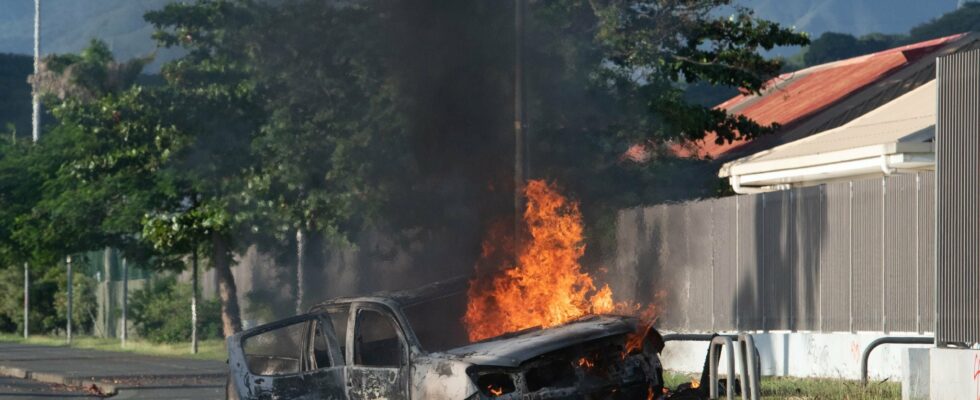This is an “unprecedented” decision in a European democracy. The French government announced this Wednesday the ban on the social network TikTok in New Caledonia, as the situation on the archipelago has continued to flare up since the start of the week. This decision was justified by the Prime Minister’s office in the media Numerama “due to the interference and manipulation of the platform whose parent company is Chinese”, adding that the application would be “used as a medium for the dissemination of disinformation on social networks, powered by foreign countries , and relayed by the rioters”.
Despite the scale of the chaos in New Caledonia, where five people have died since the start of the week, this restriction is the subject of strong criticism. Two associations, La Quadrature du Net and the Ligue des Droits de l’Homme (LDH) announced this Friday that they had filed a summary liberty order with the Council of State to suspend the decision.
“By this blocking decision, the government is dealing an unprecedented and particularly serious blow to freedom of expression online, which neither the local context nor the toxicity of the platform can justify in a rule of law,” explains in a press release La Quadrature du Net, association specializing in the defense of rights and freedoms on the Internet. “No one is fooled: in reality, the blocking of TikTok is absolutely not justified by any presence on the platform of terrorist content, but rather by the fact that it is a central platform in the online expression of people who are today coming to revolt”, continues the association.
Contacted this Wednesday by AFP, TikTok for its part considered “regrettable that an administrative decision to suspend (its) service had been taken […] without any request or question, or request for content removal, from local authorities or the French government.” “Our security teams are monitoring the situation very carefully and ensuring that our platform is safe, assures the social network. We remain available to the authorities to initiate discussions.”
The legal specificity of New Caledonia
The idea of banning TikTok is not a first at the top of the French state. It had already been mentioned during the urban riots in mainland France last summer, before being quickly abandoned, faced with the legal headache of having such a measure applied. Indeed, blocking social networks on metropolitan soil must be validated by the European Union… which is not the case for New Caledonia.
This time, the government justified this ban by proclaiming a state of emergency in New Caledonia since Wednesday. Finally, it is made possible by the fact that the only telecoms operator on the island, the post and telecommunications office, is public. Where, in mainland France, prohibiting private telecom operators (Free, SFR, Bouygues and Orange) from using a social network would be much more difficult.
A “counterproductive” blockage?
However, the government’s legal arguments are not entirely convincing. On the social network , although linked to the state of emergency. Indeed, this restriction refers to the law of April 3, 1955, which states that “the Minister of the Interior may take any measure to ensure the interruption of any online communication service to the public causing the commission of acts of terrorism or by advocating it. Still according to Nicolas Hervieu, “the link with terrorism is more than doubtful”.
Even beyond the legal aspect – therefore contested by a referral to the Council of State by Quadrature du Net and the LDH – this ban is not unanimous in the political sphere either. Renaissance MP Eric Botherel, specializing in digital issues, wondered on French as liberticide”.
For her part, Insoumise MP Mathilde Panot also criticized the ban on the social network on the island. “I do not agree with the” ban on TikTok “because what is generally done in overseas territories is then done in France,” she declared this Friday. “The situation is political, it’s because they broke a civil peace process by going into force in three days, they managed to destroy years and years of consensus,” insisted the leader of the deputies LFI, judging it “extremely suspicious to think that Azerbaijan could put 10% of the Kanak people on the streets”.
Documented interference from Azerbaijan
Still according to Eric Botherel, “we must hope that the link between TikTok and current events in New Caledonia is clearly established, otherwise the benefit-risk of such a measure could unfortunately be unfavorable”. Evidence of interference on social networks: this is what the French authorities provided this Friday… regarding X (formerly Twitter) and Facebook.
Viginum, the French organization fighting foreign digital interference, detailed in a technical sheet “several informational maneuvers of Azerbaijani origin” targeting France in the context of the riots in New Caledonia. In particular, a “massive and coordinated dissemination of manifestly inaccurate or misleading content – photo or video montages – accusing the French police of killing independence demonstrators in New Caledonia” by accounts “linked to Azerbaijani actors” was notably detected. If this report provides proof of the French government’s accusations against Azerbaijan, which accuses Baku of amplifying the riots, no details are however given on the interference maneuvers established and observed in particular on TikTok.
